
The International Atomic Energy Agency (IAEA) is an intergovernmental organization that seeks to promote the peaceful use of nuclear energy and to inhibit its use for any military purpose, including nuclear weapons. It was established in 1957 as an autonomous organization within the United Nations system; though governed by its own founding treaty, the organization reports to both the General Assembly and the Security Council of the United Nations, and is headquartered at the UN Office at Vienna, Austria.

The Treaty on the Non-Proliferation of Nuclear Weapons, commonly known as the Non-Proliferation Treaty or NPT, is an international treaty whose objective is to prevent the spread of nuclear weapons and weapons technology, to promote cooperation in the peaceful uses of nuclear energy, and to further the goal of achieving nuclear disarmament and general and complete disarmament. Between 1965 and 1968, the treaty was negotiated by the Eighteen Nation Committee on Disarmament, a United Nations-sponsored organization based in Geneva, Switzerland.

Nuclear proliferation is the spread of nuclear weapons, fissionable material, and weapons-applicable nuclear technology and information to nations not recognized as "Nuclear Weapon States" by the Treaty on the Non-Proliferation of Nuclear Weapons, commonly known as the Non-Proliferation Treaty or NPT. Proliferation has been opposed by many nations with and without nuclear weapons, as governments fear that more countries with nuclear weapons will increase the possibility of nuclear warfare, de-stabilize international or regional relations, or infringe upon the national sovereignty of nation states.

Mohamed Mostafa ElBaradei is an Egyptian law scholar and diplomat who served as the vice president of Egypt on an interim basis from 14 July 2013 until his resignation on 14 August 2013.

The Nyongbyon Nuclear Scientific Research Center (녕변원자력연구소) is North Korea's major nuclear facility, operating its first nuclear reactors. It is located in Nyongbyon County in North Pyongan Province, about 100 km north of Pyongyang. The center produced the fissile material for North Korea's six nuclear weapon tests from 2006 to 2017, and since 2009 is developing indigenous light water reactor nuclear power station technology.
Iran has several research sites, two uranium mines, a research reactor, and uranium processing facilities that include three known uranium enrichment plants.

Pakistan is one of nine states that possess nuclear weapons. Pakistan began developing nuclear weapons in January 1972 under Prime Minister Zulfikar Ali Bhutto, who delegated the program to the Chairman of the Pakistan Atomic Energy Commission (PAEC) Munir Ahmad Khan with a commitment to having the device ready by the end of 1976. Since PAEC, which consisted of over twenty laboratories and projects under reactor physicist Munir Ahmad Khan, was falling behind schedule and having considerable difficulty producing fissile material, Abdul Qadeer Khan, a metallurgist working on centrifuge enrichment for Urenco, joined the program at the behest of the Bhutto administration by the end of 1974. Producing fissile material was pivotal to the Kahuta Project's success and thus to Pakistan obtaining the capability to detonate a nuclear weapon by the end of 1984.

From the 1960s to the 1990s, South Africa pursued research into weapons of mass destruction, including nuclear, biological, and chemical weapons under the apartheid government. South Africa’s nuclear weapons doctrine was designed for political leverage rather than actual battlefield use, specifically to induce the United States of America to intervene in any regional conflicts between South Africa and the Soviet Union or its proxies. To achieve a minimum credible deterrence, a total of six nuclear weapons were covertly assembled by the late 1980s.

Iran is not known to currently possess weapons of mass destruction (WMD) and has signed treaties repudiating the possession of WMDs including the Biological Weapons Convention, the Chemical Weapons Convention, and the Non-Proliferation Treaty (NPT). Iran has first-hand knowledge of WMD effects—over 100,000 Iranian troops and civilians were victims of chemical weapons during the 1980s Iran–Iraq War.
Operation Opera, also known as Operation Babylon, was a surprise airstrike conducted by the Israeli Air Force on 7 June 1981, which destroyed an unfinished Iraqi nuclear reactor located 17 kilometres southeast of Baghdad, Iraq. The Israeli operation came a year after the Islamic Republic of Iran Air Force had caused minor damage to the same nuclear facility in Operation Scorch Sword, with the damage having been subsequently repaired by French technicians. Operation Opera, and related Israeli government statements following it, established the Begin Doctrine, which explicitly stated the strike was not an anomaly, but instead "a precedent for every future government in Israel". Israel's counter-proliferation preventive strike added another dimension to its existing policy of deliberate ambiguity, as it related to the nuclear weapons capability of other states in the region.

David Albright, M.Sc., is an American physicist and a weapons expert who is the founder of the non-governmental Institute for Science and International Security (ISIS), its current president, and author of several books on proliferation of atomic weapons.
This is the timeline of the nuclear program of Iran.

Syria and weapons of mass destruction deals with the research, manufacture, stockpiling and alleged use by Syria of weapons of mass destruction, which include chemical and nuclear weapons.

Iran's nuclear program is made up of a number of nuclear facilities, including nuclear reactors and various nuclear fuel cycle facilities.

IR-40 also known as Arak Nuclear Complex is an Iranian 40 megawatt (thermal) heavy water reactor near Arak, adjacent to the 1990s era Arak Heavy Water Production Plant. Civil works for the construction began in October 2004. It was initially planned that the reactor would begin nuclear operations in 2014.

Ali Akbar Salehi is an Iranian academic, diplomat and former head of the Atomic Energy Organization of Iran, who served in this position from 2009 to 2010 and also from 2013 to 2021. He served for the first time as head of the AEOI from 2009 to 2010 and was appointed to the post for a second time on 16 August 2013. Before the appointment of his latter position, he was foreign affairs minister from 2010 to 2013. He was also the Iranian representative in the International Atomic Energy Agency from 1998 to 2003.

Iran convened a conference titled "International Disarmament and Non-proliferation: World Security without Weapons of Mass Destruction" on 17 and 18 April 2010 in Tehran. The theme of the conference was Nuclear Energy for All, Nuclear Weapons for No One.

Fereydoon Abbasi-Davani is an Iranian nuclear scientist who was head of the Atomic Energy Organization from 2011 to 2013. He survived an assassination attempt in 2010, but was wounded. He is a conservative and principlist politician.
Views on the nuclear program of Iran vary greatly, as the nuclear program of Iran is a very contentious geopolitical issue. Uriel Abulof identifies five possible rationales behind Iran’s nuclear policy: (i) Economy, mainly energy needs; (ii) Identity politics, pride and prestige; (iii) Deterrence of foreign intervention; (iv) Compellence to boost regional influence; and (v) Domestic politics, mitigating, through 'nuclear diversion' the regime’s domestic crisis of legitimacy. Below are considerations of the Iranian nuclear program from various perspectives.
AMAD Project is an Iranian scientific project, started in 1989 and stopped in 2003 according to IAEA, that is suspected by Israel to have nonetheless continued, with the aim of developing nuclear weapons. Iran have denied the existence of any program aimed at the development of a nuclear explosive device, and in particular denied the existence of the AMAD Plan when reporting additional details to IAEA in 2015.













